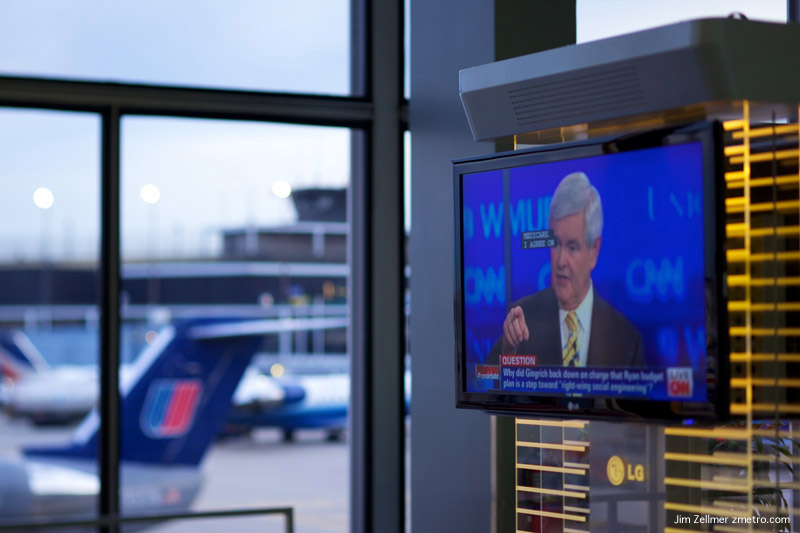General Motors CEO Dan Akerson set off something of a firestorm a few weeks ago, when he said, in response to a question about forthcoming CAFE increases:
You know what I’d rather have them do — this will make my Republican friends puke — as gas is going to go down here now, we ought to just slap a 50-cent or a dollar tax on a gallon of gas.
Predictably, populists and economic alarmists of all stripes took great umbrage at Akerson’s candor, questioning his leadership of GM as well as his perspective on the shaky US economy. But Akerson is not alone in his support of some form of gas-tax increase. Bob Lutz and Tom Friedman (an odd couple right there, if ever there was one) agree with him. Edmunds CEO Jeremy Anwyl defended Akerson and even suggested a $2/gallon tax earlier this year. Bill Ford and AutoNation’s Mike Jackson are of the same mind as now-retired Republican Senator George Voinovich on the issue. And yet, inside the Beltway, the subject tends to draw a chuckle and a roll of the eyes. Everyone wants it, but nobody wants it.
Category: Culture
How to survive the age of distraction
Read a book with your laptop thrumming. It can feel like trying to read in the middle of a party where everyone is shouting
In the 20th century, all the nightmare-novels of the future imagined that books would be burnt. In the 21st century, our dystopias imagine a world where books are forgotten. To pluck just one, Gary Steynghart’s novel Super Sad True Love Story describes a world where everybody is obsessed with their electronic Apparat – an even more omnivorous i-Phone with a flickering stream of shopping and reality shows and porn – and have somehow come to believe that the few remaining unread paper books let off a rank smell. The book on the book, it suggests, is closing.
I have been thinking about this because I recently moved flat, which for me meant boxing and heaving several Everests of books, accumulated obsessively since I was a kid. Ask me to throw away a book, and I begin shaking like Meryl Streep in Sophie’s Choice and insist that I just couldn’t bear to part company with it, no matter how unlikely it is I will ever read (say) a 1,000-page biography of little-known Portuguese dictator Antonio Salazar. As I stacked my books high, and watched my friends get buried in landslides of novels or avalanches of polemics, it struck me that this scene might be incomprehensible a generation from now. Yes, a few specialists still haul their vinyl collections from house to house, but the rest of us have migrated happily to MP3s, and regard such people as slightly odd. Does it matter? What was really lost?
Iraq 2011: Jet skiing the Triangle of Death, listening to Bee Gee songs–and pondering what comes next
The taxi driver to Beirut airport tells me that yom al-qiyama (the day of judgment) is approaching. There will be a big explosion soon — a very big explosion. The revolutions sweeping the Arab World are not good. Islamic parties will come to power everywhere. There will be no more Christians left in the Middle East. Believe me, believe me, he insists. In anticipation, he will make the Hajj to Mecca this year, inshallah. I tell him that I am traveling to Iraq as a tourist. The look he gives me in the rear view mirror says it all: He thinks I am crazy.
I am heading back to Iraq nine months after I left my job as Political Advisor to the Commanding General of U.S. Forces Iraq. Earlier this year, a Sheikh emailed me from his iPad, “Miss Emma we miss you. You must come visit us as a guest. You will stay with me. And you will have no power!” I am excited and nervous. The plane is about a third full. I am the only foreigner. I look around at my fellow passengers. I wonder who they are and whether they bear a grudge for something we might have done.
The flight is one and a half hours long. I read and doze. As we approach Iraq, I look out of the window. The sky is full of sand and visibility is poor. But I can make out the Euphrates below. Land of the two rivers, I am coming back.
I do not have an Iraqi visa. Visas issued in Iraqi Embassies abroad are not recognized by Baghdad airport. I have a letter from an Iraqi General in the Ministry of Interior, complete with a signature and stamp. In the airport, I present my passport and letter, fill out a form, pay $80, and receive a visa within 15 minutes. I collect my bag. I am through. I want to reach down and touch the ground, this land that has soaked up so much blood over the years — ours and theirs.
US doctors braced for deep cuts in spending
Doctors treating the poor in the US are braced for significant reductions to their services amid increased pressure from both the Obama administration and Republicans for deep cuts in health spending.
Twenty-nine Republican governors have called for greater flexibility in how states administer Medicaid programmes for the poor, a move which coincides with the Obama administration’s withdrawal of stimulus funds used to pay for treatment.
Nearly 49m people in the US, or one in six Americans, were covered by Medicaid in 2009. The figure is thought to be higher today.
The federal government increased its subsidies to the states under the stimulus programme, spending $2.68 for every dollar a state spent on Medicaid, nearly twice as much as before the stimulus.
Life on the open road
My Cool Campervan. By Jane Field-Lewis and Chris Haddon with photography by Tina Hiller. Pavilion; 160 pages; £14.99.
THE classic VW camper van is a venerable vehicle on which rides–usually rather slowly–a carefree image of life on the open road. They can often be found in the narrow British lanes leading to the surfing beaches in Cornwall in the summertime. But as old ones in good nick can cost £20,000 ($33,000) or more, many of their owners are more likely to be trying to recapture their lost youth than hanging ten.
There are many variations of the VW camper van, not least because until 2005 Volkswagen never made a camper itself, but produced vans for transporting people and goods which others converted with the addition of caravan-style living accommodation. And it was not just VWs which received such attention, as “My Cool Campervan” shows in a collection of photo essays.
Monday Evening Scene

Visualizing Historical Data, And The Rise Of “Digital Humanities”
All historians encounter them, at some point in their careers: Vast troves of data that are undeniably useful to history–but too complex to make narratively interesting. For Stanford’s Richard White, an American historian, these were railroad freight tables. The reams of paper held a story about America, he knew. It just seemed impossible to tell it.
Impossible to tell in a traditional way, that is. White is the director of the Stanford University Spatial History Project, an interdisciplinary lab at the university that produces “creative visual analysis to further research in the field of history.” (The images in this post are taken from the project’s many visualizations.) Recent announcements on the project site announce “source data now available” (openness is one of the project’s tenets) on such topics as “Mapping Rio,” “Land Speculation in Fresno County: 1860-1891,” and “When the Loss of a Finger is Considered a ‘Minor’ Injury.”
Invasion of the body hackers
Michael Galpert rolls over in bed in his New York apartment, the alarm clock still chiming. The 28-year-old internet entrepreneur slips off the headband that’s been recording his brainwaves all night and studies the bar graph of his deep sleep, light sleep and REM. He strides to the bathroom and steps on his digital scale, the one that shoots his weight and body mass to an online data file. Before he eats his scrambled egg whites with spinach, he takes a picture of his plate with his mobile phone, which then logs the calories. He sets his mileage tracker before he hops on his bike and rides to the office, where a different set of data spreadsheets awaits.
“Running a start-up, I’m always looking at numbers, always tracking how business is going,” he says. Page views, clicks and downloads, he tallies it all. “That’s under-the-hood information that you can only garner from analysing different data points. So I started doing that with myself.”
His weight, exercise habits, caloric intake, sleep patterns – they’re all quantified and graphed like a quarterly revenue statement. And just as a business trims costs when profits dip, Galpert makes decisions about his day based on his personal analytics: too many calories coming from carbs? Say no to rice and bread at lunchtime. Not enough REM sleep? Reschedule that important business meeting for tomorrow.
The founder of his own online company, Galpert is one of a growing number of “self-quantifiers”. Moving in the technology circles of New York and Silicon Valley, engineers and entrepreneurs have begun applying a tenet of the computer business to their personal health: “One cannot change or control that which one cannot measure.”
Trout….

The Dilemma
If there is one most frightening thing that war always exposes, even if one is on the winning side, it’s weakness in the supply logistics. While most never consider it, official policy often changes during a war because supplies that are critical to the war effort seem in danger of being disrupted. Such jeopardy, moreover, forces the accountants, economists and politicians waging the conflict to start thinking about how the world will be changed once the fighting has ended.
Few today appreciate the fact that our foreign policy, particularly as it is tied to the Middle East, came about because of just such concerns in the first years of the Second World War. As one might expect, that official policy was based on real fears that America would one day run out of oil.
“The European War”
It was the summer of 1941 and the State Department had requested that the White House include Saudi Arabia in our Lend Lease program. It wasn’t because the Saudis were going to become a direct ally against the European Axis Powers, but because we were about to embargo U.S. oil shipments to Japan. Many believed – correctly, as it turned out – that this would probably lead to hostilities with Japan that would draw us into the war.
Standard Oil of California, which had been drilling for oil in Bahrain for over a decade, now had oil concessions granted by King ibn Saudi. The first six wells Standard drilled into the Arabian desert were nothing to write home about, but when Well No. 7 came in on March 4, 1938, the engineers and wildcatters all knew that Saudi Arabia was going to be an oil bonanza.
Yet on July 18, 1941, Roosevelt refused the request for Lend Lease for Saudi Arabia. He saw no immediate benefit to diverting U.S. dollars overseas simply because Standard had oil concessions there. In any case, the outbreak of the European War in 1939 had reduced oil production in the Kingdom to an insignificant volume — a trickle, considering that American oil amounted to 60 percent of the world’s crude at the time. Instead Roosevelt asked Federal Loan Administrator Jesse Jones to look into the possibility of having England deal with the Saudi King’s pressing needs.